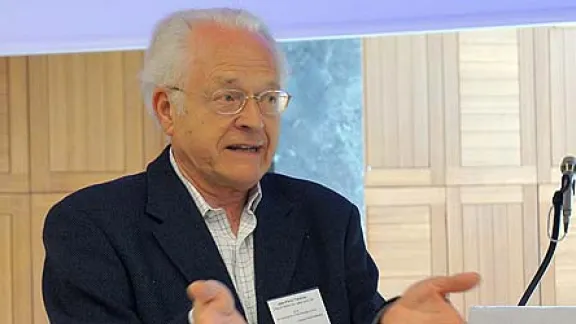
Swiss theologian Rev. Dr Jean-Pierre Thévenaz delivers his presentation at the LWF symposium on work and coordination. © LWF/I. Benesch
Theology, Technology and Power in Networking
Humanitarian and development workers, theologians and scholars at a symposium on work organized by The Lutheran World Federation (LWF) discussed how coordination and networking can support organizational effectiveness.
The symposium coordinated by the LWF Department for Theology and Public Witness (DTPW) noted that while there is no single approach to achieving good results in an organization, establishing agreed standards to coordinate planning and activities gets more work done with relatively less costs, and creates room for learning from a variety of contributors.
“Lack of coordination would mean that actors have no arena to discuss or communicate the different objectives and alternatives. In the end the whole process takes more time than the different actors expect or are interested in investing,” Dr Julia Fleischer told participants attending the 1 May symposium at the Ecumenical Center in Geneva.
In her opening presentation, the assistant professor of political science at the University of Amsterdam, Netherlands, said academicians and practitioners are increasingly paying attention to coordination because of growing complexity in decision-making, globally. She elaborated the positive and negative perspectives of coordination, models of organizational structures and the perceptions of actors who are influenced by their own jurisdictions and worldviews.
For faith-based organizations with a variety of actors from different contexts and many objectives—diakonia, humanitarian assistance, environment, gender, and justice issues—coordination can create unclear and controversial understandings about the benefits of different programs and ‘technologies’, Fleischer noted. By technologies, she referred to the methods used to reach the intended goals.
Fleischer concluded that in any institution or setting, coordination can be difficult but it is “highly indispensable,” as it is a prerequisite for coherent decision-making and consensus building between different interests.
Spirit of Life
Reformed Swiss theologian Rev. Dr Jean-Pierre Thévenaz, co-founder of the network, Church Action on Labour and Life (CALL), spoke about the deep connection between work and “the spirit of life”. Coordination of work, he told the symposium, “must address how we experience life at different levels from birth, education, and even death; we need to think about it from the perspective of God who is working in us to achieve all.”
Responding to a question on whether contemporary theological education supports this task of coordination for “shared life” today, Thévenaz was emphatic that currently theological studies “are constructed outside this shared life, and are constrained to pure church life which does not help the church to be present in the public debate. We need to have pastors who are able to speak in places where the church finds itself.”
New Media, Power and Performance
In his presentation on coordination in the global church and the digital revolution, Rev. Roger Schmidt discussed possibilities for the global church to use modern technology to connect Christians locally with each other around the world.
Schmidt, executive director of the Swiss-based association ‘Digital Encounters’, challenged church organizations to explore the use of smart digital tools to share their learning with the broader community so that Christians locally can also enjoy the reality of the global church.
There are various religious narratives that help faith-based organizations to see coordination in its positive and negative aspects, said Rev. Dr Simone Sinn, LWF study secretary for Public Theology and Interreligious Relations at DTPW. Her presentation on religious and theological resources for coordination highlighted the impact of three dimensions of power: the desire to be all-powerful (hubris); power over the other (asymmetry); and power without the other (strife).
The meaning of coordination, Sinn emphasized, implies putting “power with the other at the center. It results in cooperation and in empowerment; it is not unlimited power but power in relation to the common task and in relation to who we are.”
Ms Simangaliso Hove, secretary for Program and Project Coordination at the LWF Department for Mission and Development discussed why organizations need to measure and manage performance in coordinating systems. “It’s important to look at work processes and see if they could be reorganized more efficiently, especially when funds are dwindling. Management systems also make [staff] aware of their contributions’ worth.”
Humanitarian Relief
Through its Department for World Service, the LWF collaborates with United Nations (UN) agencies to provide humanitarian relief in different parts of the world.
Concrete examples by Mr Pascal Daudin from the International Committee of the Red Cross (ICRC) and Mr Brian Lander from the World Food Program (WFP) showed how realities on the ground must inform global coordination. The challenges that major UN and other humanitarian partners encounter in delivering timely and relevant assistance to people affected by crises were discussed.
Around 30 participants, mainly from organizations in the Ecumenical Center attended the LWF symposium, the third in a series on work and faith that DTPW began in 2011. Previous focus areas included “Trust in the workplace” and the “Dignity of work” – of which the latter is documented in the publication Dignity of Work – Theological and Interdisciplinary Perspectives (2011).
“The inter-disciplinary nature of coordination calls for a critical analysis of our shared life at work. We can do more if we coordinate more,” concluded Rev. Dr Kenneth Mtata, DTPW study secretary for Lutheran Theology and Practice, the symposiums’ coordinator.


